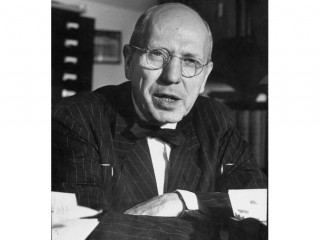
Douglas Southall Freeman biography
Date of birth : 1886-05-16
Date of death : 1953-06-13
Birthplace : Lynchburg, Virginia, U.S.
Nationality : American
Category : Famous Figures
Last modified : 2011-03-02
Credited as : Journalist, biographer, awarded Pulitzer Prize
The American journalist Douglas Southall Freeman was one of the major biographers in the United States during the 20th century.
Douglas Southall Freeman was born at Lynchburg, Va., on May 16, 1886, the son of a Confederate veteran. His family soon moved to Richmond, where Freeman was educated. After graduating from Richmond College in 1904, he proceeded to Johns Hopkins, where he received his doctorate in history at the age of 22. The only copy of his dissertation on the Virginia Secession Convention was lost in a fire.
Freeman returned to Richmond to work for the state tax commission as well as for local newspapers. In 1908 he edited the Calendar of Confederate Papers, demonstrating his continued interest in Southern history. In 1911 he joined the News Leader, the Richmond newspaper that was his employer for the rest of his journalistic career. The next year Freeman edited the Reports on Virginia Taxation, and in 1914 he married.
In 1915 Freeman took two major steps. He became editor of the News Leader and signed a contract for a biography of Robert E. Lee. He started the biography while fully employed as a newspaperman with side interests in lecturing and radio commentary. By 1926 Freeman had established his famous work schedule: mornings—4:30 A.M. to noon—on the newspaper, afternoons on history. His R. E. Lee (4 vols., 1934-1935) won a Pultizer Prize and made his reputation. It also resulted in Freeman's academic appointment as visiting professor of journalism at Columbia University (1934-1935). Freeman held the rank from 1936 to 1941 but was not in residence.
Lee's biography was a skillful amalgam of military history and biography which, according to historian Michael Kraus, has no superior in the "whole range of American biographical literature." Looking at the world through Lee's eyes and with no more information than Lee had, Freeman developed Lee's character and ideas.
In 1936, utilizing his leftover data, Freeman commenced a study of the Army of Northern Virginia which was published as Lee's Lieutenants (3 vols., 1942-1944). Regarded by Freeman as his best, though most difficult, work, it unraveled the complexity of the command structure of the army.
In 1945 Freeman began his most ambitious work, a biography of George Washington. Not until 1949 did he give up his newspaper position to become a full-time historian. Still he did not have enough time; only six of the seven proposed volumes were finished when he died on June 13, 1953. Freeman had not lived to hear the acclaim for George Washington: A. Biography (1948-1957).
















